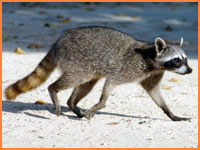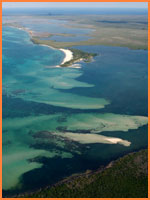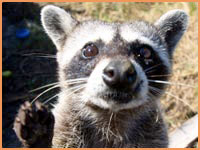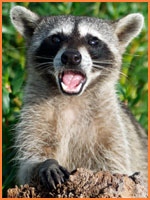This new article in our series about native Cozumel wildlife takes a look at the island's Pygmy Raccoons.
Pygmy Raccoons are seen frequently in the north-west of Cozumel and it's sometimes hard to believe that these friendly little creatures are actually on the endangered species list.
However, even though they can be quite easy to spot, they are endemic to Cozumel, meaning they are not found anywhere else in the world.
With this in mind, it's easier to understand why they're endangered, since the estimated Cozumel population of around 500 is all that is left on the planet.
Known locally as mapaches, or Procyon pygmaeus in Latin to biologists, they are related to their larger relatives on the mainland, but have evolved separately over time due to their isolation on the island.

Only around 500 of the species left.
The last official academic study of the population was made in 2008. A team led by Mexican biologist, Alfredo D. Cuarón, concluded that their number was declining due to the threat of introduced species, such as imported mainland animals and feral cats and dogs.
Local resident and kiteboard instructor, Raul de Lille, has lived and worked most his life near the raccoons, and remembers that they used to be found mainly on Passion Island, just off Cozumel's north-west coast.
He says that it was the destruction of Hurricane Gilbert in 1988 that forced them to move onto the northern mainland of Cozumel, where they are frequently seen today.

North-west Cozumel.
According to Cuarón, the raccoons are normally a solitary animal that sometimes forms family groups and likes to eat crabs, as well as fruits, insects, crayfish and small vertebrates.
However, due to the increasing presence of humans and the temptation to feed these cute creatures, part of the population in the north has become quite tame.
"It has become a weekend tradition for local families to come north to see and feed them," says De Lille, "We often see them in the Country Club and during the night they raid garbage containers, some people are rude enough to let their dogs chase them away."
Cuarón recommends garbage containers with secure lids to avoid this problem and says the raccoons should be left to eat their own natural diet.

Friendly, but in danger.
It would be a great shame if future generations did not get to enjoy the sight of these rare local animals, and their absence could also have a negative knock on effect for the wider island ecosystem.
But the north of the island is now a protected environmental area and it is illegal to introduce mainland species to Cozumel, so the framework is already in place to help their survival.
Hopefully, with a little more education - for both locals and visitors - the decrease in population of this wonderful mammal will be turned around, and they can finally be taken off the critical list.
Look for Cozumel Pygmy Raccoons on our Passion Island, Pearl Farm and Punta Molas tours in the north of Cozumel or for more information about the threat against the species see their entry on the IUCN Red List.
Related Items:
Northern Lagoons Photo Album on Facebook.





